Fiction
Nonfiction
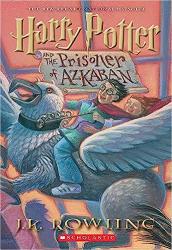
Harry Potter and the Prisoner of Azkaban is the third book in the Harry Potter series. This book is a must read if you enjoyed the previous two books.
Harry Potter, a wizard going into his third year at Hogwarts School of Witchcraft and Wizardry, has a connection to the escaped serial killer, Sirius Black. Black now is thought to be trying to murder Harry Potter on behalf of Voldemort. Dementors are sent to the campus of Hogwarts in order to keep students safe from Black. Hermione is juggling taking 12 classes and being busier than ever. Her cat is set on killing Ron's sick rat creating tension in the trio. Professor Lupin, the new Defense Against the Dark Arts teacher, helps Harry cope with the awful affect the dementors seem to have on him. Meanwhile, Harry tries to discover the tie between Black and himself.
I read this book because I was a fan of the previous two books in the series. The characters and setting in this book make it easy to fall in love with. The author uses imagery to make it feel as if you are really there with the characters. This made the book an absolute blast to read. The ending tied everything together and prevented loopholes in the plot. I disliked the ending in the regard that Harry didn't get his happily ever after.
Harry Potter and the Prisoner of Azkaban is the third book in the Harry Potter series. This book is a must read if you enjoyed the previous two books.
Harry Potter, a wizard going into his third year at Hogwarts School of Witchcraft and Wizardry, has a connection to the escaped serial killer, Sirius Black. Black now is thought to be trying to murder Harry Potter on behalf of Voldemort. Dementors are sent to the campus of Hogwarts in order to keep students safe from Black. Hermione is juggling taking 12 classes and being busier than ever. Her cat is set on killing Ron's sick rat creating tension in the trio. Professor Lupin, the new Defense Against the Dark Arts teacher, helps Harry cope with the awful affect the dementors seem to have on him. Meanwhile, Harry tries to discover the tie between Black and himself.
I read this book because I was a fan of the previous two books in the series. The characters and setting in this book make it easy to fall in love with. The author uses imagery to make it feel as if you are really there with the characters. This made the book an absolute blast to read. The ending tied everything together and prevented loopholes in the plot. I disliked the ending in the regard that Harry didn't get his happily ever after.
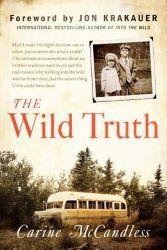
"The Wild Truth" is Carine McCandless' follow-up to Jon Krakauer's "Into the Wild". Carine McCandless wrote this novel after being pained by the reactions to "Into the Wild", especially the general opinion on Chris McCandless' self-inflicted exile from common society. This book succeeds in explaining more of Chris' life before his hitchhiking escapade. These sections were my favorite part of the book: unfortunately, they were mostly only present in the beginning. I struggled to pull through the longer sections where Carine explained her own life. Parts felt unnecessary, other section dragged on too long, and even more just felt completely unrelated to Chris or "Into the Wild". I wanted to read this book to understand Chris. I enjoyed learning about Carine, but I was reading for Chris. I'm quite lucky that I can't relate to large parts of this book. "The Wild Truth" really drags the reader along to help them understand the terrible abuse in the McCandless family. I can understand the difficult parents; I can relate to the family drama, constant switching between divorce and being back together, etc. that Carine had to live through. Regardless, this book stepped too far away from "Into the Wild" in a way that I did not enjoy. However, this book was still informative about the general McCandless family. There are absolutey readers in the world who can take more from this book than I could, but I will never consider this one of my favorite books.
Reviewer Grade: 11
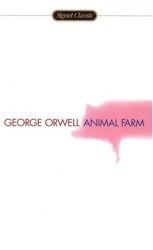
Animal Farm is a book where animals on a farm represent the Russian Revolution. The animals rebel against the farmers to try and escape cruelty and be free. But, it doesn't end up going as planned, and things start to go wrong on the farm. I thought that this book was very educational and it was interesting to see how people, who were represented by the animals, can change so fast. I would recommend this book to anyone who has an interest in history and the Russian Revolution.
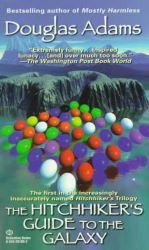
A Hitchhikers Guide to the Galaxy was a funny but interesting book. The book is about aliens destroying Earth to make way for an intergalactic bypass, and it follows a few characters trying to survive the universe that they've been put into. There were also many comedic moments, including strange things that the characters need in order to survive and be safe out in the galaxy, such as a towel, which is really important. The only thing I didn't really like about this book was that it was really difficult to understand at times. There were lots of confusing moments and new things just kept coming. But at the end of the book most of it started to make sense. Overall I thought this book was a great read if you like humor and are interested in space.
Reviewer Grade: 8
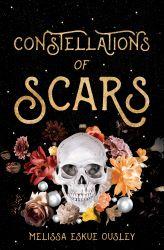
This is definitely an eventful book. "Constellations of Scars" follows Amelia Weaver. For unexplained reasons, she grows pearls on her skin every month. Her mother keeps her shut inside the house, restricting her freedom. One day she decides to escape and try her hand at the real world. She ends up working for a freak show, though they are unaware of her own oddity.
Let's start with the characters. Amelia herself is perfectly acceptable. She doesn't have any noteworthy character traits, or anything to help her stand out besides the whole pearl thing. However, her motivation is clearly defined and all of her choices make sense. Gabe is probably the best character in the book. His backstory is interesting, and his somewhat reclusive demeanor is off putting without being unlikeable. Unfortunately, most of his character development happens within ten pages. Peter is... interesting. I'll talk about him in the spoilers section.
The best part about this book is the writing. It keeps the reader engaged the whole way through. While the descriptions are detailed, the author does not dwell on them long enough to bore the reader. One interesting thing about this book is the chapter length. While there are long chapters, there are also chapters that only last a few pages. I found that this kept the story at a fast pace, further keeping me involved.
The plot is the main failing of the book. Spoilers from here on out. It starts off strong, setting up themes of isolation and hiding. Several conflicts were set up, most notably Amelia's mother and the possibility of the world finding out about her secret. However, all of these conflicts are suddenly solved halfway through the book. From that point on, it shifts to a thriller about Peter secretly being a serial killer. I'm not kidding. There are hints that Peter isn't as nice as he appears, so it doesn't come out of nowhere. However, it drastically shifts the course of the story, to the point where it feels like two separate stories.
Despite this criticism, this wasn't a bad book. I enjoyed myself while reading it. Furthermore, it's a quick read (perfect for car trips or bedtime). If you're looking for an engaging story with twists and turns, this is for you. If you're looking for a cohesive story with interesting themes, this book isn't for you.
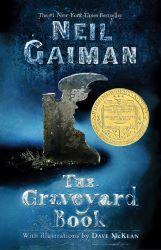
The Graveyard Book, written by Neil Gaiman, is a mystical, interesting book. In the book, a young boy is taken in and cared for by ghosts of a graveyard. The boy is kept in secret, and is named Bod, short for Nobody. The book follows Bod's adventures in growing up and continuing his life, in and out of the graveyard. I thought this was a great book, packed full of magic special characters. I would definitely recommend this book to anyone, but mostly a more mature audience, because there are some parts that I feel are harder to understand if you are younger, and at some parts the book is a little slow. But overall I think this was one of the best books I've read this year!
Reviewer Grade: 8
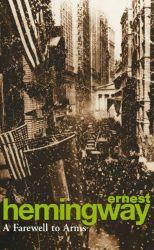
A Farewell to Arms, written by Ernest Hemingway, details the account of Frederic Henry, a medic for the Italian army during the Italian campaign of World War One. He is sent to the front lines of the war, and while he is eating dinner, a bomb explodes over him and he is injured. During his recovery process, he falls in love with Cathrine Barkley, an English nurse. Henry soon desires to leave the army and will do so in any means possible so that he can escape and be with his Ms. Barkley. I enjoyed the book because it was quite satirical, except the humor was quite advanced, so I would recommend this book to teenagers and adults. Overall, however, it was grammatically unique and I believe that I have become not only a better reader from reading this book, but a better writer as well.
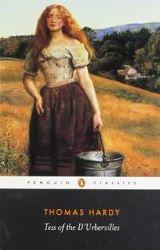
WARNING: This reveiw and this book contains discussion of sexual assult.
Tess of the D'urbervilles is an excellent book. It tells the story of Tess Durbyville, who's father has become obessed with the idea of their noble heritage. After an incident with the carriage, the family is left in financial peril. Tess agrees to work for her supposed relations. However, this leads her into the arms of Alexander D'urberville (who is not actually related to her).
Tess herself is a great protagonist. She's well defined as a dreamer who is devoted to her family. Both of these traits help her, but cost her dearly. Alexander is a more complex antagonist than you'd first assume, while still being hatable. Angel Clare is a good character as well, he has well defined traits, but I was not able to end up liking him. He admits to not being a Christian, and not believing in all of the doctrines of the Bible (just to clarify, almost all of today's Christians would take issue with the way Angel treats Tess). Furthermore, he openly admits to his parents that he does not have the same beliefs he does. Yet, he still abandons Tess because of these beliefs (that he doesn't have).
That brings me to the major problem. Tess is constantly thinking about how Alexander is her true husband, and how she is ruined. While these are realistic things for someone in her predicament to think, I felt that the book does not take a strong enough stance against these beliefs. If it wasn't for this, I would have given the book 5 stars (if I had the option, I would have given it 4.5). Tess of the D'urbervilles has excellent prose, shocking twists, tragic moments, and great character progression. If you are not uncomfortable reading about sexual assault and you enjoy classic literature, I would recommend this book.
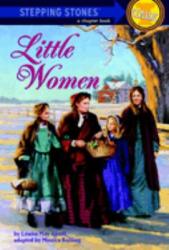
This is a classic book about four sisters who are growing up during the civil war era. Their beloved father is off fighting in the war while the girls and their mother, who everyone lovingly calls "Marmee", tend to life back home. The girls befriend the neighbor boy, Laurie, who they view and treat as their brother. Throughout the story, you follow the journey of the family's lives, mostly tomboy Jo's, from the comfort of their childhood home to each of the girls eventually creating a home of their own.
I think what makes this story one of my favorites is the fact that even though it's a classic, it's one that is easy to follow along with. This is actually the only classic I've read through twice. The characters develop amazingly throughout the story and you really feel like you know the characters well by the last page. This is an amazing book that truly takes you on the journey of the story rather than trying to keep you in suspense the entire time. This book definitely helped me to learn to take my time while reading a book and to allow the story to develop rather than jumping ahead and trying to rush the book. I don't usually like romance books, but I did like this book because when it came to the small parts that dealt with romance, the girls were always encouraged by their Marmee to marry for love rather than for money, wealth or status. This is a theme that is upheld throughout the book and one I think makes this book an enduring classic through generation after generation.
I would recommend this book for anyone looking for a classic that has a fun story, easier to understand language and lovable characters.
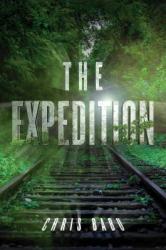
The second book in the Initiation series, we get to see more of the world. As the characters move farther out, they see that the leaders of New America have lied about the state of the world. As the protagonists go on through their journey, they start to uncover more and more secrets that New America has decided to bury. Though they are not left alone on their quest as New America has left them with four highly trained soldiers, supposedly to defend them from any danger. Tensions continue to grow between the Guardians and Draydens group, and both sides start to grapple for control, eventually splitting off. Both sides become contenders to finish the pursuit for supplies and tell their side first to New America.
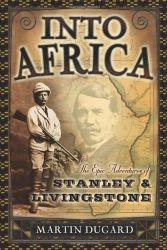
Into Africa, written by Martin Dugard, details the epic adventures of Stanley Livingstone and his trek across Africa to find the source of the Nile River. Livingstone battles disease, unfriendly tribes, and stubborn porters (the people who help carry supplies) in his journey. The brutal, but beautiful march encompasses Africa from it sweltering hot savannahs to it thick rainforests. I would recommend this book to anyone who likes adventure because this book is about the exploration of Africa. I enjoyed this book because it taught me a lot more about Africa and it's people.
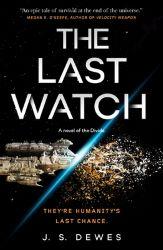
This is Dewes' fantastic debut novel about space, politics, and unknowable existence-ending eternal temporal torment. In fact, that last detail is my favorite part about the book. Not only is it an extremely interesting and unique concept for an antagonist, it is also a great antagonist. It is something that can be understood by the reader, but can't reasonably be understood by the reader. It in itself is a paradox that works as possibly my favorite antagonist this year. Again, it is simply the greatest unique idea I have read in a long time. I picked this book because I also loved Dewes' novel "Rubicon", so I looked for more books by the author. I honestly can't pinpoint a criticism that I have with this book. This book had just enough surprises where I was absolutely entertained, but I could still keep track of what was happening and which characters stood for what. I could relate to Adequin in her feeling of being inadequate (and actually being inadequate) for her assigned position. This book is a strong contender for being the greatest book that I have read this year.
Reviewer Grade: 11
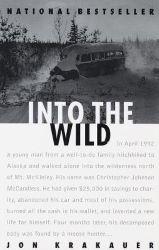
Jon Krakauer's "Into the Wild" might be the greatest nonfiction book I have read this year. I was assigned this book to read over my summer break for my English class. I am extremely grateful for this because it was very likely that I would not have discovered this masterpiece on my own. My favorite part about the book was the exact thing that Krakauer wared about in his forward; the author's similar personal experience. In a more general term, I savored every moment where Krakauer connected McCandless' story to other lesser-known examples in history, like John M. Waterman or Gene Rosellini. My least favorite part about the book wasn't explicitly in the book: the lack of definitive information outside of Into the Wild about McCandless makes me doubt some of the credibility of the information that Krakauer provided. Even if the factual information was true, I am still confronted with the author's admission that some of the details in the book were opinionated by Krakauer. The book was full of surprises. I will not spoil any, but the father's reaction when seeing "the scene" shocked me. I personally could not relate to any of the characters in this book. I lack the all-consuming drive to
reach a mostly independent state from society, and I have never fretted over a lost child. Regardless of my lack of a personal connection, this book was an extremely powerful book about those in society that wish to be outside society.
Reviewer Grade: 11
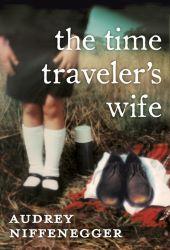
"The Time Traveler's Wife", written by Audrey Niffenegger, is the fictional account of Henry DeTamble, a man with a unique genetic condition that causes him to involuntarily time travel, and his wife Clare Abshire. The narrative follows their love story as they navigate the challenges posed by Henry's sporadic disappearances and unpredictable reappearances at various points in time. I really enjoyed how the plots all came together; while Clare aged normally, she would see Henry at different stages of his life. For example, when Henry time travels, he sees Clare when she is 13 and when he is 35. Another time Henry was 28 whilst Clare was 20. Clare's development was linear, while Henry's was sporadic. I would recommend this book to adults who enjoy a good love story. However, there is some adult content in the book so I would not recommend it for children or teenagers.
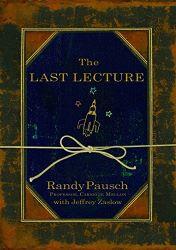
"The Last Lecture" is a non-fiction book based on a lecture delivered by Randy Pausch, a computer science professor diagnosed with terminal cancer. Pausch's lecture, titled "Really Achieving Your Childhood Dreams," was delivered at Carnegie Mellon University and became a sensation, garnering millions of views online. The lecture was eventually turned into a book by Jeffery Zaslow. In the book, Pausch expands on the themes from his lecture, sharing his wisdom, insights, and life lessons as he confronts his mortality. He encourages readers to pursue their passions, live fully in the present, and embrace the power of perseverance and resilience. Pausch's poignant and inspiring message serves as a reminder of the importance of cherishing every moment and making the most of the time we have. I believe his heart-wrenching story should be shared with everyone. We are all mortal in the end, but most of us choose to act as if we are not; Pausch encourages us to not waste the valuable time that we have.
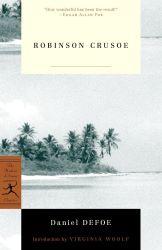
"Robinson Crusoe" is a fictional novel by Daniel Defoe; telling the story of Robinson Crusoe, a young Englishman who becomes stranded on a deserted island after a shipwreck. The novel follows his solitary existence as he learns to survive, building shelter, finding food, and adapting to the challenges of his new environment. Over the years, Crusoe encounters both moments of despair and triumph, offering readers a captivating tale of resilience, self-reliance, and the indomitable human spirit. I was fascinated by this book; if I were to compare it to another book I would say that it is the grown up version of Hatchet (written by Gary Paulsen). I would recommend this book to anyone who enjoys a good adventure novel.
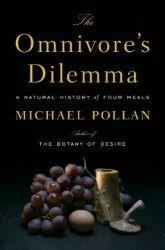
The Omnivore's Dilemma, written by Micheal Pollan, provides the reader with an analytical view of what we, as humans, should eat. He dives into the industrialization of corn production. Because the government of the United States subsidizes corn, more farmers produce corn than in a free market society, thus there is a surplus of corn. With this surplus, industries evolved to consume the cheap, plentiful corn. One example is the concentrated animal feeding operation (CAFO, commonly referred to as a "feedlot"). People feed cows (that are packed in fences) the cheap corn, which decreases the price of the cows, which then leads to the creation of more business selling far more affordable cow meat, such as McDonalds. Although the food is far more accesible and less of a budget burden, Pollan raises questions about the health externality of eating corn fed cows. Because the cows are packed together, disease tends to run rampant, so the cows' food (chopped up corn) is mixed with a variety of antibiotics and hormones to control disease. When we eat the cow, what is fed to the cow is now fed to us. I enjoyed the book because it made me more cognizant about the food I put in my body, and I would recommend this book to anyone who is curious about the logistics of how and where we get our food.
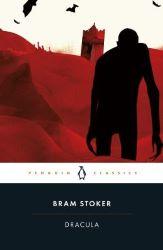
Dracula, written by Bram Stoker, is a fictional account of a vampire hunt in Transylvania. Jonathan Harker, a lawyer, is sent by his boss to Castle Dracula to assist in a real estate transaction with a wealthy man named Count Dracula. However, he is soon not allowed out of the castle, and slowly he realizes the the Count is no ordinary man. Harker manages to escape and eventually teams up with a colleague to hunt down Count Dracula. I enjoyed the book, it was full of complex back stories that merged into one beautiful crescendo: the hunt of the Count. I would recommend this book to anyone wanting to expand their vocabulary, as the book is rich with complex words and sentences. I would also recommend this book to avid readers; (as it is a classic) it should be ensured that to be a genuine reader one must read this famous work of art.
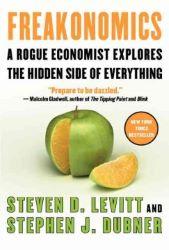
"Freakonomics" written by economist Steven D. Levitt and journalist Stephen J. Dubner, explores unconventional connections between economics and various aspects of society, challenging conventional wisdom. Levitt's research delves into topics such as the economics of drug dealing, the impact of parenting on a child's success, and the hidden motivations behind seemingly irrational behaviors. The authors highlight the power of data analysis and critical thinking to uncover surprising insights. The book ultimately encourages readers to question assumptions, think outside the box, and view the world through an economic lens to gain a deeper understanding of human behavior. I recommend this book to anyone who enjoys economics, as well as questions conventional ideas of society.




